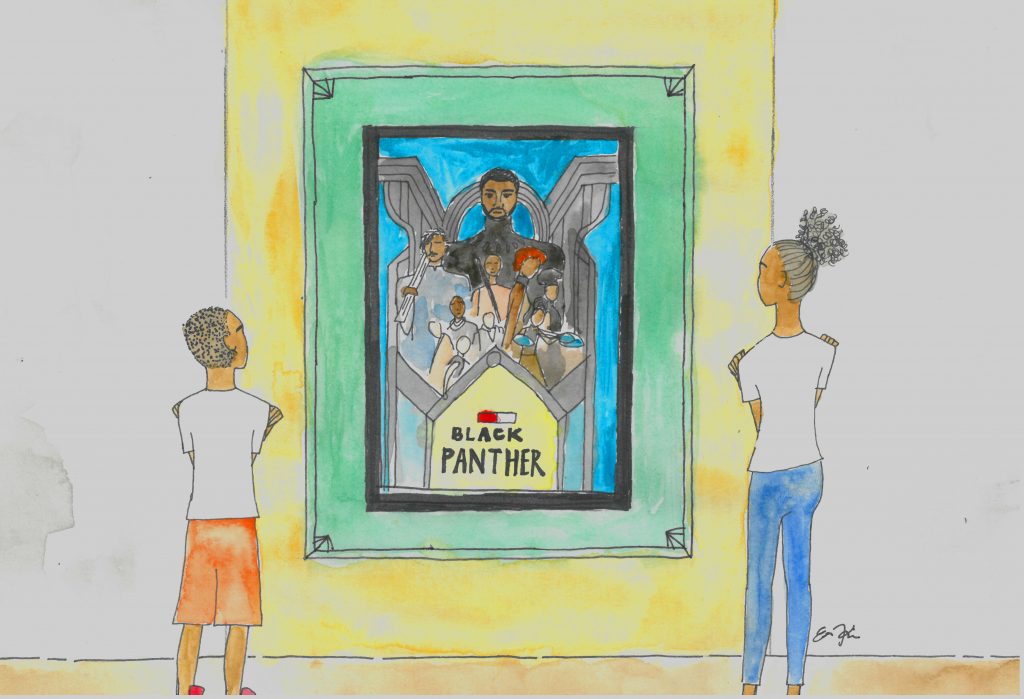Black Panther is a 2018 Marvel movie which focuses on the world of Wakanda, a fictional nation in Africa. To the rest of the world, Wakanda is a small country which, as a result of escaping European colonization, is impoverished and untouched by development. The isolationist nation is instead the most technologically-advanced in the world due to its discovery of the powerful and nearly indestructible metal, vibranium. Aside from breaking numerous box office records, Coogler’s work on the film combined with its empowering message made Black Panther the highest grossing film of all time by a black director.
The film’s concept originated from a comic of the same name created by Jack Kirby and Marvel Universe icon Stan Lee, who passed away late last year. The character is credited as the first black superhero. While the name “Black Panther” is unrelated to the Black Panther political party, which was formed several months following the character’s creation, Lee and Kirby had the same social issues in mind.
The beauty of Black Panther lies in the power of representation. Representation is about creating role models which empower kids and adults, many of whom take cues from the characters they see on screen. This concept is not just speculation, it’s well-backed by research. According to Nicole Martins, an Associate Professor at Indiana University, “There’s this body of research and a term known as ‘symbolic annihilation,’ which is the idea that if you don’t see people like you in the media you consume, you must somehow be unimportant.” A 2011 study found that in media, portrayals of black males are often negative. This fuels stereotypes and spreads misconceptions to communities with little to no black populations. These misconceptions can have serious implications, from “less attention from doctors to harsher sentencing by judges, lower likelihood of being hired for a job or admitted to school, lower odds of getting loans, and a higher likelihood of being shot by police.”
Black Panther chooses instead to portray both black men and women as powerful, spreading empowering messages to those who often get left behind. Letitia Wright plays Shuri, T’Challa’s 16-year-old sister and the innovative designer for all of Wakanda’s advanced technology. Shuri presents an important role model for young black girls — especially considering that black women earn 10 times fewer PhDs than their white female counterparts. The film also presents Wakanda as leaps and bounds ahead of the rest of the world. Enough so to motivate the nation to hide its success, fearing that outsiders would eventually attempt invasions with the goal of stealing Wakanda’s most valuable resource, vibranium. This plot point is almost reminiscent of the foreign harvesting of diamonds in 19th century South Africa. Almost poetically, vibranium signifies Africa’s worth and importance beyond its stereotype as a third world society. Those connected to Wakanda, know something others don’t, much like how those with African heritage are in tune with the beauty of African culture. Black Panther makes a powerful statement about why being black should be a source of pride, not a disadvantage.
Even before seeing the film, the idea of watching a movie packed with positive black role models was exciting in itself. When surprised with tickets to Black Panther, students at Ron Clark Academy, a predominantly black middle school in Atlanta, were filmed ecstatically cheering and dancing on tables. Additionally, the words “Wakanda forever,” which could be seen all over social media not long after the film’s release have taken on a life of their own. The phrase has become representative of African pride, signifying unity through a common thread of heritage which connects people from all over the world.
Superheroes are more important than you may think. Even if we don’t have access to vibranium, superheroes inspire us to find meaning in pain and trauma and to cope with adversity not by giving up, but by getting back up and fighting harder. We should all be celebrating movies which inspire us, especially those who are overlooked or underrepresented. So if you haven’t seen Black Panther yet, February is the perfect time to get the full experience.
Emily Ertle
staff writer
Graphic: Erin Kim

